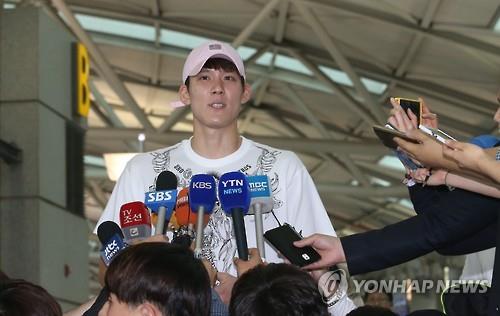- California Assembly OKs highest minimum wage in nation
- S. Korea unveils first graphic cigarette warnings
- US joins with South Korea, Japan in bid to deter North Korea
- LPGA golfer Chun In-gee finally back in action
- S. Korea won’t be top seed in final World Cup qualification round
- US men’s soccer misses 2nd straight Olympics
- US back on track in qualifying with 4-0 win over Guatemala
- High-intensity workout injuries spawn cottage industry
- CDC expands range of Zika mosquitoes into parts of Northeast
- Who knew? ‘The Walking Dead’ is helping families connect
S. Korean Olympic body keeps Rio ban on swimmer Park Tae-hwan

South Korean swimmer Park Tae-hwan speaks to reporters at Incheon International Airport before departing for his Australian training camp on June 3, 2016.
SEOUL, (Yonhap) — The top national sports body decided Thursday to keep its Summer Games ban on swimmer Park Tae-hwan, dealing what may be the final blow to his fading Olympic hopes.
In a board of directors meeting, the Korean Olympic Committee (KOC) said it wouldn’t amend its rule blocking Park from competing in this year’s Rio de Janeiro Summer Games because of his doping history.
The KOC bans athletes who’ve served doping suspensions from representing the country for three years, starting on the day that their suspensions end. Park, the 2008 Olympic champion in the 400m freestyle, served an 18-month ban that began retroactively in September 2014 and ended in March of this year.
On April 26, Park filed an appeal against the KOC rule at the Court of Arbitration for Sport (CAS), the highest sports tribunal. He later asked the procedure to be put on hold so he could speak to the KOC before taking further legal steps.
Park had been scheduled to meet with the KOC on May 25 but postponed the talks indefinitely without providing a reason. Now that the KOC has reaffirmed its stance, Park is expected to ask the CAS to resume its proceedings.
Defying the criticism of double punishment, the KOC has long maintained it won’t make special exceptions for any particular athlete.
“We instituted this particular rule because competing for the country demands high moral standards,” said Han Jong-hee, a KOC director. “Doping runs counter to the spirit of fair play, and we felt we needed to be strict in this regard for the sake of educating young athletes.”
Han said the KOC will inform the CAS of its decision and will “actively respond” to any arbitration proceedings as necessary.
Despite his Rio ban, Park chose to compete at the final Olympic trials in April and won the 100m, 200m, 400m and 1,500m freestyle races. He also met the Olympic “A” standards set by FINA, the international swimming governing body, in all four, and his accomplishments put further pressure on the KOC to reinstate Park.
Critics of the controversial rule say the KOC is unfairly punishing the swimmer twice for the same offense, and that the principle of double punishment runs counter to international standards.
In 2011, the CAS handed down a decision against the International Olympic Committee’s “Osaka Rule,” which barred athletes who had served a doping suspension for at least half a year from competing in the following Olympics. The CAS said the Osaka Rule, adopted in 2008, was “a violation of the IOC’s own statute and is therefore invalid and unenforceable.”
Team GMP, Park’s agency, announced at a press conference later Thursday the swimmer has asked the CAS to resume its arbitration proceedings. Park is currently training in Australia.
Lim Sung-woo, an attorney at the press conference, said he is reviewing additional legal steps in case the KOC refuses to honor the CAS ruling.
“The KOC rule infringes upon athletes’ basic human rights, but the KOC continues to argue it’s a valid rule,” Lim said. “Given the precedents at the CAS, I don’t see any reason why this case should be any different (than earlier rulings), unless the KOC resorts to delaying tactics.”
Lim said the CAS ruling will be binding, and those who contend otherwise may be doing so for their lack of legal knowledge.
The KOC previously claimed Park’s case wouldn’t be subject to CAS arbitration citing the lack of a key element required for such proceedings.
According to the KOC’s rule, any sports-related dispute arising within the KOC must be resolved by “any specific conciliation, mediation or arbitration body established by the KOC under separate regulations.”
And those who wish to appeal any final decision by that arbitration body may do so at the CAS within 21 days of the receipt of the decision.
The KOC said on May 17 it hadn’t reached a “final decision” on Park’s status and therefore the swimmer couldn’t take his case to the CAS.
At the time, the KOC said it would make that final decision in its June board meeting.
Park’s camp had argued that the KOC had already made such a decision on April 7, when it announced it wouldn’t change its national team rule for anyone in particular.
According to an official in Park’s camp, the CAS has agreed to expedite its ruling by July 8, so that Park would still have a chance to compete in Rio should the tribunal rule in his favor.
The deadline to finalize the national team swimming roster is July 18. Park was left off the preliminary roster announced on May 11.
Park said last month he understood going to the CAS was his “last recourse,” and that he was still hopeful that the KOC would alter its stance.












